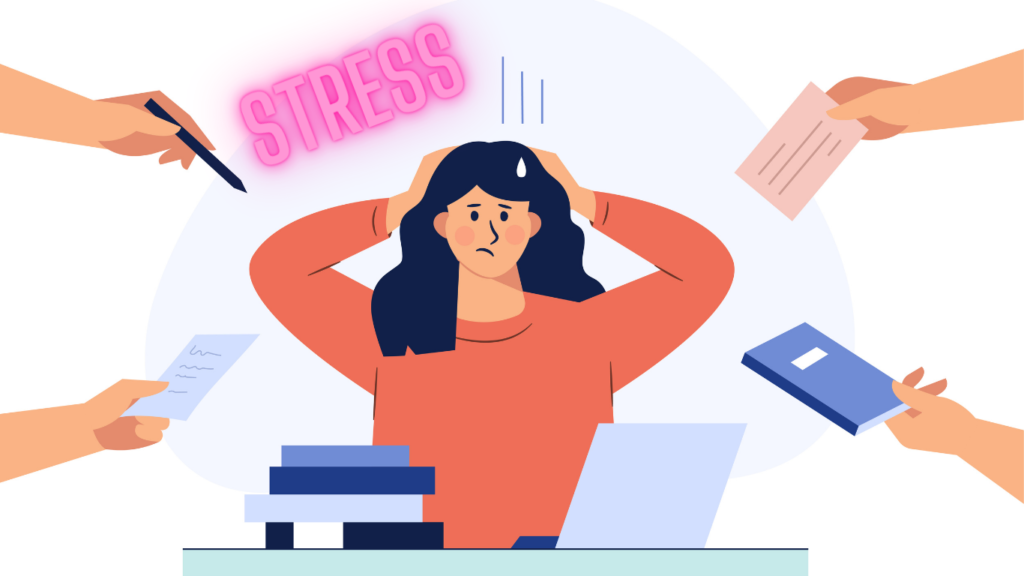How To Reduce Stress: Effective Strategies For Managing Everyday Pressure
Published by fitpathguide.com on
How To Reduce Stress And Effective Strategies

In today’s fast-paced world, learning effective strategies for how to reduce stress is essential for maintaining our well-being and happiness.In our busy lives, stress is something many of us experience. It’s that feeling of being under pressure, whether from work, family, or other responsibilities. But learning to deal with stress is key to staying well and happy. In this blog, we’ll explore what stress is, why we feel it, how it affects us, and most importantly, ways to cope with it and lead a more peaceful life. can i write this in my blog
What is Stress?
Stress is the body’s natural response to any demand or threat. It triggers the “fight or flight” response, releasing hormones like adrenaline and cortisol to prepare the body for action. While stress can be a motivator in small doses, chronic stress can have detrimental effects on health.
Why Do We Feel Stress?
There are various factors that contribute to stress, including biological, psychological, and environmental factors. Biological factors such as genetics and brain chemistry play a role, while psychological factors like personality traits and coping mechanisms also influence how we respond to stress. Additionally, external factors such as work, relationships, and financial concerns can contribute to feelings of stress.
Stress Symptoms:
Stress can manifest in a variety of ways, including physical symptoms like headaches, muscle tension, and fatigue, as well as emotional symptoms like irritability, anxiety, and depression. Behavioral symptoms such as changes in appetite, sleep disturbances, and social withdrawal are also common indicators of stress.
Effective Stress Management Techniques:
Deep Breathing Exercise: Find a calm, comfortable space to settle down. Close your eyes gently and begin by inhaling deeply through your nose, counting to four as you fill your lungs with air. Hold this breath for a steady count of four, then exhale slowly through your mouth for another count of four. Repeat this soothing routine several times, focusing on each breath and allowing yourself to unwind completely with each exhale.
Progressive Muscle Relaxation (PMR): Start by sitting or lying down in a comfortable position. Begin with your toes, tightly curling them for a few seconds, then release and let them relax completely. Move on to your calves, thighs, abdomen, shoulders, fists, and face, tensing each muscle group for a few seconds before releasing. Continue this process, moving through each muscle group in your body.
Mindfulness Meditation: Create a quiet space where you can sit comfortably without distractions. Close your eyes and bring your attention to your breath, noticing the sensations of each inhale and exhale. When your mind wanders, gently guide your focus back to your breath without judgment. Practice this awareness of the present moment, allowing thoughts to come and go without attachment.
Regular Exercise: Engage in activities that bring you joy and movement, such as walking, dancing, or yoga. Aim for at least 30 minutes of physical activity most days of the week to boost endorphins and reduce stress. Choose activities that resonate with you and make you feel alive and energized.
Cultivating Gratitude: Take a few moments each day to reflect on the things you’re grateful for. This could be anything from the people in your life to the simple pleasures of everyday living, like a warm cup of tea or a beautiful sunset. Write them down in a journal if you like, or simply take a moment to appreciate them in your mind.
Setting Boundaries: Identify the things in your life that cause you stress or make you feel overwhelmed. This could be work, social commitments, or even certain relationships. Learn to say no to these things when they don’t align with your priorities or values, and don’t be afraid to communicate your boundaries to others.
Sufficient Sleep: Establish a calming bedtime ritual to signal to your body that it’s time to relax. Switch off electronic devices, dim the lights, and participate in soothing activities such as reading or taking a warm bath. Strive to maintain a consistent sleep schedule by going to bed and waking up at the same time each day to regulate your sleep cycle.
Connecting with Others: Reach out to friends, family members, or support groups when you’re feeling stressed or overwhelmed. Schedule regular catch-ups or phone calls to maintain connections and seek support when needed.
Time Management: Make a to-do list or use a planner to prioritize tasks and allocate time for relaxation and self-care. Break larger tasks into smaller, manageable steps and set realistic deadlines to avoid feeling overwhelmed.
Practice Positive Self-Talk: Engage in positive self-talk by paying attention to your inner dialogue and replacing negative thoughts with affirming statements. Rather than focusing on worries or self-criticism, remind yourself of your strengths, achievements, and resilience.
Importance of Seeking Professional Help:

The importance of seeking professional help in managing stress cannot be emphasized enough. While self-help strategies can sometimes be effective, there are occasions when professional intervention becomes necessary. Therapists or counselors are equipped to provide valuable support, guidance, and coping strategies tailored to each individual’s unique needs. They offer a safe space to explore underlying issues, develop healthy coping mechanisms, and work towards long-term stress management and emotional well-being.
FAQ
What is the best exercise for stress?
The best exercise for stress is one that you enjoy and can do regularly. Activities like yoga, walking, jogging, swimming, or even dancing are great for reducing stress as they release endorphins and improve overall mood. Deep-breathing exercises and meditation are also highly effective for calming the mind.
How to relax the mind from stress?
To relax your mind, try mindfulness techniques like meditation, deep breathing, or progressive muscle relaxation. Spending time in nature, journaling your thoughts, listening to calming music, or practicing gratitude can also help. Ensuring proper sleep and limiting screen time are other effective ways to relax your mind.
Why am I overthinking?
Overthinking often stems from anxiety, fear of failure, or uncertainty. It can also be triggered by perfectionism or past negative experiences. To overcome overthinking, focus on the present moment, practice self-compassion, and challenge your negative thoughts with logical reasoning.
How to Handle Extreme Stress?
To manage extreme stress effectively, start by identifying what is causing it. Practice relaxation techniques such as meditation, deep breathing, or yoga to calm your mind. Divide large tasks into smaller, achievable steps to reduce feelings of overwhelm. Seek emotional support from loved ones or consult a professional if needed. Prioritize self-care by eating a nutritious diet, engaging in regular physical activity, and getting enough quality sleep to help your body recover and stay resilient.
How do I control my stress levels?
To control stress levels, adopt a proactive approach:
- Practice time management to reduce workload.
- Exercise regularly to boost your mood.
- Engage in hobbies or activities you enjoy.
- Practice mindfulness or meditation daily.
- Avoid unhealthy coping mechanisms like smoking or excessive caffeine.
What are physical signs of stress?
Physical signs of stress can include headaches, muscle tension, fatigue, rapid heartbeat, upset stomach, and difficulty sleeping. You may also experience weight changes, loss of appetite, or increased cravings. Chronic stress might weaken your immune system and make you more prone to illness.
What exercises are good for stress management?
Exercises like yoga, tai chi, and pilates are excellent for stress management as they combine movement with mindful breathing. Cardiovascular exercises such as running, cycling, or swimming release endorphins, helping to reduce stress. Simple activities like stretching or taking a brisk walk can also make a big difference.
0 Comments